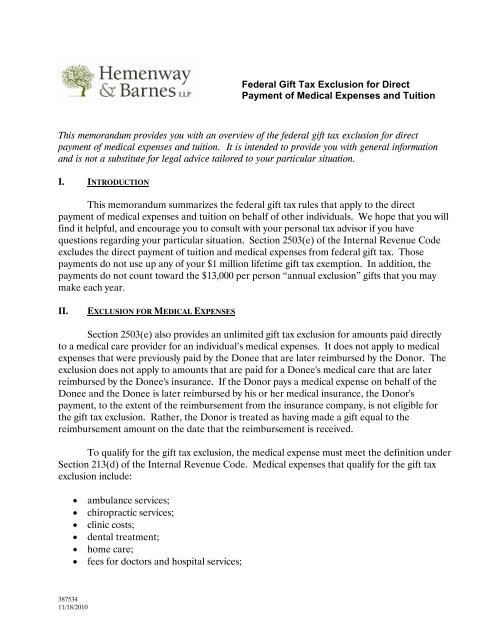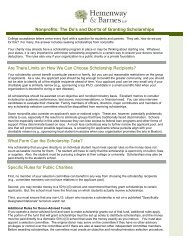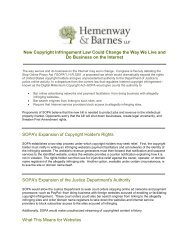Federal Gift Tax Exclusion for Direct Payment of Medical Expenses ...
Federal Gift Tax Exclusion for Direct Payment of Medical Expenses ...
Federal Gift Tax Exclusion for Direct Payment of Medical Expenses ...
You also want an ePaper? Increase the reach of your titles
YUMPU automatically turns print PDFs into web optimized ePapers that Google loves.
<strong>Federal</strong> <strong>Gift</strong> <strong>Tax</strong> <strong>Exclusion</strong> <strong>for</strong> <strong>Direct</strong><br />
<strong>Payment</strong> <strong>of</strong> <strong>Medical</strong> <strong>Expenses</strong> and Tuition<br />
This memorandum provides you with an overview <strong>of</strong> the federal gift tax exclusion <strong>for</strong> direct<br />
payment <strong>of</strong> medical expenses and tuition. It is intended to provide you with general in<strong>for</strong>mation<br />
and is not a substitute <strong>for</strong> legal advice tailored to your particular situation.<br />
I. INTRODUCTION<br />
This memorandum summarizes the federal gift tax rules that apply to the direct<br />
payment <strong>of</strong> medical expenses and tuition on behalf <strong>of</strong> other individuals. We hope that you will<br />
find it helpful, and encourage you to consult with your personal tax advisor if you have<br />
questions regarding your particular situation. Section 2503(e) <strong>of</strong> the Internal Revenue Code<br />
excludes the direct payment <strong>of</strong> tuition and medical expenses from federal gift tax. Those<br />
payments do not use up any <strong>of</strong> your $1 million lifetime gift tax exemption. In addition, the<br />
payments do not count toward the $13,000 per person “annual exclusion” gifts that you may<br />
make each year.<br />
II.<br />
EXCLUSION FOR MEDICAL EXPENSES<br />
Section 2503(e) also provides an unlimited gift tax exclusion <strong>for</strong> amounts paid directly<br />
to a medical care provider <strong>for</strong> an individual’s medical expenses. It does not apply to medical<br />
expenses that were previously paid by the Donee that are later reimbursed by the Donor. The<br />
exclusion does not apply to amounts that are paid <strong>for</strong> a Donee's medical care that are later<br />
reimbursed by the Donee's insurance. If the Donor pays a medical expense on behalf <strong>of</strong> the<br />
Donee and the Donee is later reimbursed by his or her medical insurance, the Donor's<br />
payment, to the extent <strong>of</strong> the reimbursement from the insurance company, is not eligible <strong>for</strong><br />
the gift tax exclusion. Rather, the Donor is treated as having made a gift equal to the<br />
reimbursement amount on the date that the reimbursement is received.<br />
To qualify <strong>for</strong> the gift tax exclusion, the medical expense must meet the definition under<br />
Section 213(d) <strong>of</strong> the Internal Revenue Code. <strong>Medical</strong> expenses that qualify <strong>for</strong> the gift tax<br />
exclusion include:<br />
• ambulance services;<br />
• chiropractic services;<br />
• clinic costs;<br />
• dental treatment;<br />
• home care;<br />
• fees <strong>for</strong> doctors and hospital services;<br />
387534<br />
11/18/2010
<strong>Federal</strong> <strong>Gift</strong> <strong>Tax</strong><br />
<strong>Exclusion</strong> <strong>for</strong> <strong>Direct</strong><br />
<strong>Payment</strong> <strong>of</strong> <strong>Medical</strong><br />
<strong>Expenses</strong> and Tuition<br />
• long term care insurance premiums;<br />
• medical devices such as hearing aids, crutches, orthopedic shoes, elastic hosiery and<br />
wheelchairs;<br />
• medical insurance premiums, deductibles and coinsurance amounts;<br />
• nursing services;<br />
• prescription medicines;<br />
• physical exams;<br />
• physical therapy;<br />
• psychological treatment;<br />
• special education and training <strong>for</strong> physically and mentally handicapped people;<br />
• travel costs directly related to medical care (including meals and lodging);<br />
• vaccines;<br />
• vision care (exams, eyeglasses and contact lenses); and<br />
• x-ray and laboratory services<br />
Not all medical expenses qualify. <strong>Medical</strong> expenses do not include cosmetic surgery or<br />
other similar procedures, unless the surgery or procedure is necessary to correct a de<strong>for</strong>mity<br />
that arises from or is directly related to a congenital abnormality, a personal injury resulting<br />
from an accident or trauma, or a disfiguring disease.<br />
III.<br />
GIFT TAX EXCLUSION FOR TUITION<br />
Section 2503(e) excludes tuition payments made directly to an educational organization<br />
on behalf <strong>of</strong> an individual from federal gift tax. The exclusion is available regardless <strong>of</strong> the<br />
relationship between the Donor and the Donee, and is in addition to the $13,000 per Donee<br />
annual exclusion from gift tax. For purposes <strong>of</strong> the gift tax exclusion, an "educational<br />
organization" is one that normally maintains a regular faculty and curriculum, focuses primarily<br />
on <strong>for</strong>mal instruction, and has a regularly enrolled body <strong>of</strong> students. Educational<br />
organizations include primary, secondary and preparatory and high schools, as well as public<br />
and private colleges and universities.<br />
The exclusion may or may not be available <strong>for</strong> tuition payments made directly to a<br />
nursery, preschool, day care program or camp. In order to be eligible <strong>for</strong> the exclusion, the<br />
program must be primarily educational rather than custodial in nature. The organization must<br />
maintain a regular faculty and curriculum, have a regularly enrolled body <strong>of</strong> students, and have<br />
<strong>for</strong>mal instruction as its primary function. For example, a group day care program with a<br />
regular enrollment <strong>of</strong> children aged 3-6 years, who attended five days a week throughout the<br />
year, operated in an open classroom setting with various groups receiving different<br />
387534<br />
- 2 -
<strong>Federal</strong> <strong>Gift</strong> <strong>Tax</strong><br />
<strong>Exclusion</strong> <strong>for</strong> <strong>Direct</strong><br />
<strong>Payment</strong> <strong>of</strong> <strong>Medical</strong><br />
<strong>Expenses</strong> and Tuition<br />
instructions, planned educational activities and problem solving, and where the instruction was<br />
provided by a head teacher and at least two assistants <strong>for</strong> each classroom, qualified as an<br />
educational organization. In contrast, a family day care program providing child care in the<br />
homes <strong>of</strong> a staff <strong>of</strong> child-care trained personnel, including story reading, projects involving<br />
science or art, letters and numbers, did not qualify as an educational organization.<br />
The exclusion applies only to tuition expenses <strong>of</strong> full time or part time students that are<br />
paid directly to the qualifying educational institution. Donors can pre-pay several years worth<br />
<strong>of</strong> tuition and apply the gift exclusion if the pre-paid tuition is non-refundable. The exclusion<br />
does not apply to tuition expenses previously paid to the educational institution by the Donee<br />
or the Donee's parents. The exclusion does not apply if the Donor transfers funds to an<br />
irrevocable trust and the trustees pay tuition expenses. The exclusion is not available <strong>for</strong><br />
amounts paid <strong>for</strong> books, supplies, dormitory fees, room and board or other expenses that do<br />
not constitute direct tuition costs.<br />
387534<br />
- 3 -




